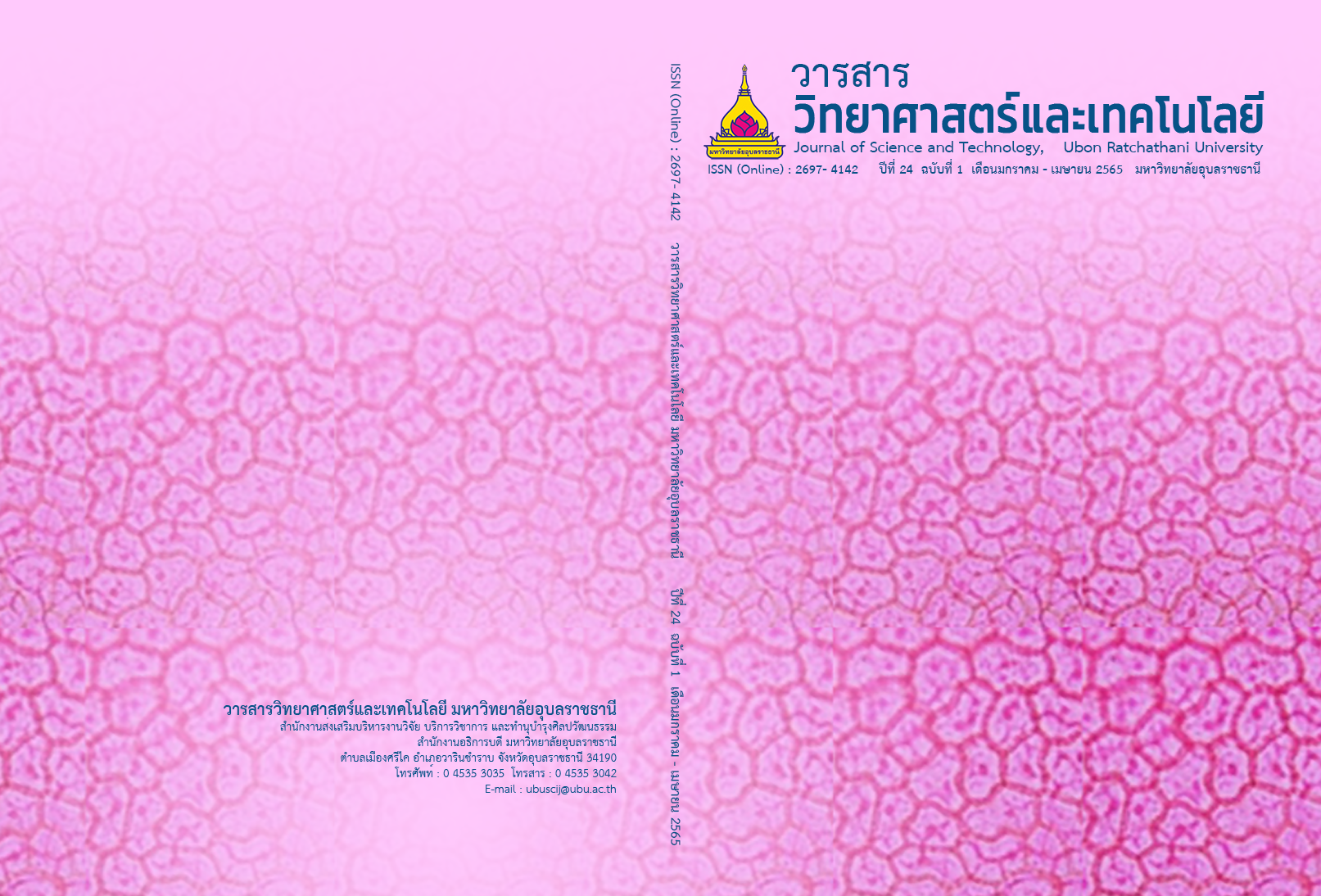การใช้สารสกัดหยาบของใบมังคุดในการยับยั้ง Aeromonas hydrophila
Main Article Content
บทคัดย่อ
งานวิจัยนี้มีวัตถุประสงค์เพื่อทดสอบความสามารถของสารสกัดหยาบของใบมังคุดในการยับยั้ง Aeromonas hydrophila และเพื่อหาความเข้มข้นต่ำสุดของสารสกัดหยาบของใบมังคุดที่สามารถยับยั้งการเจริญเติบโตของ A. hydrophila ในการทดสอบความสามารถในการยับยั้ง A. hydrophila โดยวิธี agar well diffusion โดยใช้สารสกัดหยาบของใบมังคุดที่มีความเข้มข้น 200,000 150,000 100,000 50,000 และ 10,000 ส่วนในล้านส่วน พบว่า สารสกัดจากใบมังคุดที่ความเข้มข้น 200,000 ส่วนในล้านส่วน มีฤทธิ์ในการยับยั้ง A. hydrophila ได้ดีที่สุด โดยโซนใสมีเส้นผ่านศูนย์กลางเท่ากับ 1.245±0.056 เซนติเมตร นอกจากนี้แล้วจากการศึกษาด้วยวิธี broth dilution assay ยังพบว่าความเข้มข้นต่ำสุดของสารสกัดหยาบของใบมังคุดที่สามารถยับยั้ง A. hydrophila ได้ มีค่าเท่ากับ 1,563 ส่วนในล้านส่วน การศึกษานี้ชี้ให้เห็นว่าสารสกัดหยาบของใบมังคุดมีศักยภาพที่จะนำมาใช้แทนยาปฏิชีวนะในการยับยั้ง A. hydrophila การศึกษานี้แสดงให้เห็นว่าใบมังคุด ซึ่งหาได้ง่ายในประเทศไทย สามารถใช้เป็นทางเลือกให้กับเกษตรกรในการควบคุมโรคที่เกิดจาก A. hydrophila ซึ่งจะช่วยทำให้ลดการใช้ยาปฏิชีวนะที่ส่งผลเสียต่อสิ่งแวดล้อม
Article Details

อนุญาตภายใต้เงื่อนไข Creative Commons Attribution-NonCommercial-NoDerivatives 4.0 International License.
บทความที่ได้รับการตีพิมพ์เป็นลิขสิทธิ์ของ วารสารวิทยาศาสตร์และเทคโนโลยี มหาวิทยาลัยอุบลราชธานี
ข้อความที่ปรากฏในบทความแต่ละเรื่องในวารสารวิชาการเล่มนี้เป็นความคิดเห็นส่วนตัวของผู้เขียนแต่ละท่านไม่เกี่ยวข้องกับมหาวิทยาลัยอุบลราชธานี และคณาจารย์ท่านอื่นๆในมหาวิทยาลัยฯ แต่อย่างใด ความรับผิดชอบองค์ประกอบทั้งหมดของบทความแต่ละเรื่องเป็นของผู้เขียนแต่ละท่าน หากมีความผิดพลาดใดๆ ผู้เขียนแต่ละท่านจะรับผิดชอบบทความของตนเองแต่ผู้เดียว
เอกสารอ้างอิง
Omar, A.A., Moustafa, E.M. and Zayed, M.M. 2016. Identification and characterization of virulence-associated genes from pathogenic Aeromonas hydrophila strains. World's Veterinary Journal. 6(4): 185-192.
Stratev, D. and Odeyemi, O.A. 2017. An overview of motile Aeromonas septicaemia management. Aquaculture International. 25: 1095-1105.
Valladao, G.M., Gallani, S.U. and Pilarski, F. 2015. Phytotherapy as an alternative for treating fish disease. Journal of Veterinary Pharmacology and Therapeutics. 38: 417-428.
Zhu, F. 2020. A review on the application of herbal medicines in the disease control of aquatic animals. Aquaculture. 256: 735422.
Yeung, S. 2006. Mangosteen for the cancer patient: Facts and myths. Journal of the Society for Integrative Oncology. 4(3): 130-134.
Janardhanan, S. and et al. 2017. Antimicrobial effects of Garcinia Mangostana on cariogenic microorganisms. Journal of Clinical and Diagnostic Research. 11(1): ZC19-ZC22.
Alsultan, Q.M.N. and et al. 2016. Gc-Ms analysis and antibacterial activity of mangosteen leaf extracts against plant pathogenic bacteria. American of Journal of Plant Sciences. 7(7): 1013-1020.
Assemian, I.C.C.A. and et al. 2019. Garcinia mangostana leaf extracts from Ivory coast possess remarkable antioxidant, anti-inflammatory, and cytotoxicological properties. Biomedical and Pharmacology Journal. 12(2): 571-578.
Silaket, P. and Pakdeedashakiat, V. 2017. Application of antimicrobial compounds from lactic acid bacteria for inhibiting food borne pathogens. Journal of Science and Technology, Ubon Ratchathani University. 19(Special issue): 51-61. (in Thai)
Akao, Y. Nakagawa, Y. and Nozawa, Y. 2008. Anti-cancer effects of xanthones from pericarps of mangosteen. International Journal of Molecular Sciences. 9(3): 355-370.
Suhartati, R. and et al. (2019). Antimicrobial activity test of mangosteen leaves ethanol extract (Garcinia mangostana Linn) against Pseudomonas aeruginosa bacteria. Journal of Physics: Conference Series. 1179: 012167.
Purivirojkul, W., Visetson, S. and Areechon, N. 2003. Efficiency of Clinacanthus nutans and Psidium guajava extracts to control Zoothamnium sp. in black tiger shrimp (postlarva stage). Thai Journal of Science and Technology. (11): 9-15. (in Thai)
Petsiri, J., Tunsuwan, K. and Ruangkhlai, K. 2007. The Effect of Flavonoids Compound, Extracted from Mangosteen Leaves, on Sex-reversal in Nile Tilapia (Oreochromis niloticus L.). Songkla: Thaksin University. (in Thai)


